BSBLEG515 - Legal Principles: Will and Power of Attorney Assignment
VerifiedAdded on 2022/10/09
|9
|2197
|49
Homework Assignment
AI Summary
This assignment, prepared for Mount Gravatt Law Centre, addresses key aspects of Wills and Power of Attorney. The assignment begins by explaining the importance of having a Will, outlining benefits for family/friends, defining 'intestate' and identifying the relevant Australian succession law. It then discusses court jurisdiction in intestate cases and the actions taken. The assignment further explores when and how to update a Will, providing relevant examples. It covers the process of updating a Will, including changes to beneficiaries and property. It also addresses the handling of a previous Will and the special rules for signing and witnessing a Will. The assignment concludes by explaining options for safekeeping a Will and who to provide a copy to. References to relevant legal resources are provided.
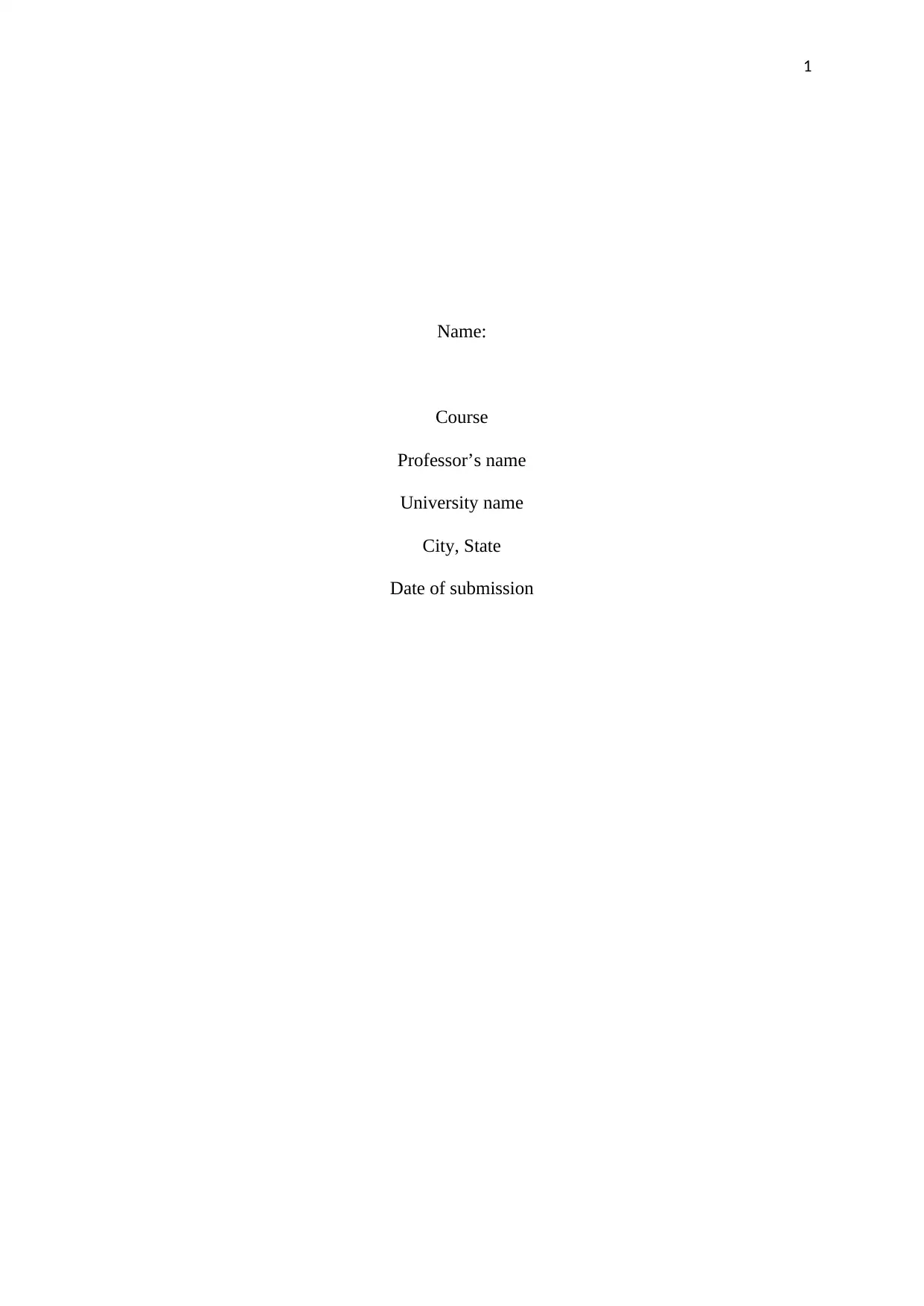
1
Name:
Course
Professor’s name
University name
City, State
Date of submission
Name:
Course
Professor’s name
University name
City, State
Date of submission
Paraphrase This Document
Need a fresh take? Get an instant paraphrase of this document with our AI Paraphraser
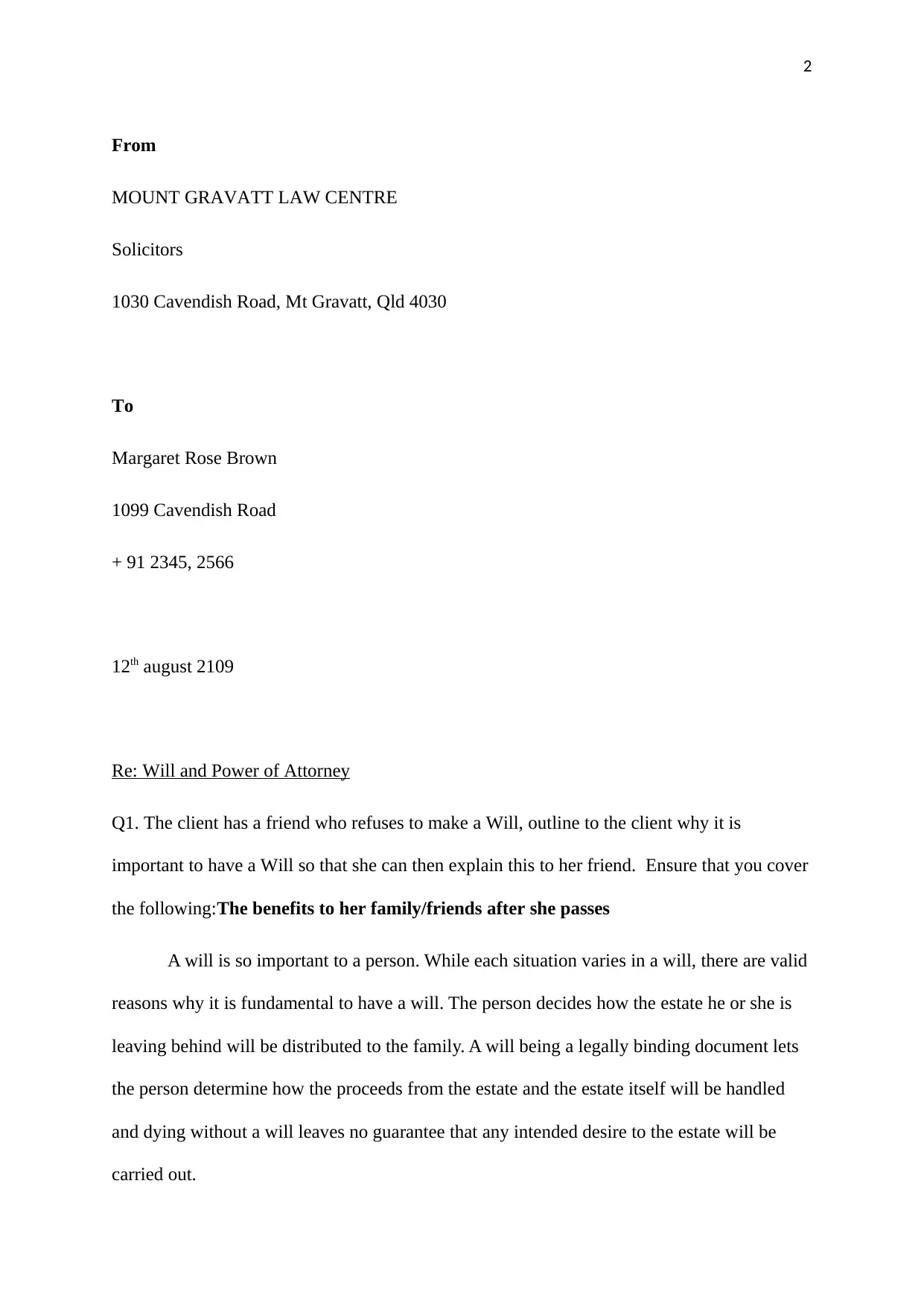
2
From
MOUNT GRAVATT LAW CENTRE
Solicitors
1030 Cavendish Road, Mt Gravatt, Qld 4030
To
Margaret Rose Brown
1099 Cavendish Road
+ 91 2345, 2566
12th august 2109
Re: Will and Power of Attorney
Q1. The client has a friend who refuses to make a Will, outline to the client why it is
important to have a Will so that she can then explain this to her friend. Ensure that you cover
the following:The benefits to her family/friends after she passes
A will is so important to a person. While each situation varies in a will, there are valid
reasons why it is fundamental to have a will. The person decides how the estate he or she is
leaving behind will be distributed to the family. A will being a legally binding document lets
the person determine how the proceeds from the estate and the estate itself will be handled
and dying without a will leaves no guarantee that any intended desire to the estate will be
carried out.
From
MOUNT GRAVATT LAW CENTRE
Solicitors
1030 Cavendish Road, Mt Gravatt, Qld 4030
To
Margaret Rose Brown
1099 Cavendish Road
+ 91 2345, 2566
12th august 2109
Re: Will and Power of Attorney
Q1. The client has a friend who refuses to make a Will, outline to the client why it is
important to have a Will so that she can then explain this to her friend. Ensure that you cover
the following:The benefits to her family/friends after she passes
A will is so important to a person. While each situation varies in a will, there are valid
reasons why it is fundamental to have a will. The person decides how the estate he or she is
leaving behind will be distributed to the family. A will being a legally binding document lets
the person determine how the proceeds from the estate and the estate itself will be handled
and dying without a will leaves no guarantee that any intended desire to the estate will be
carried out.
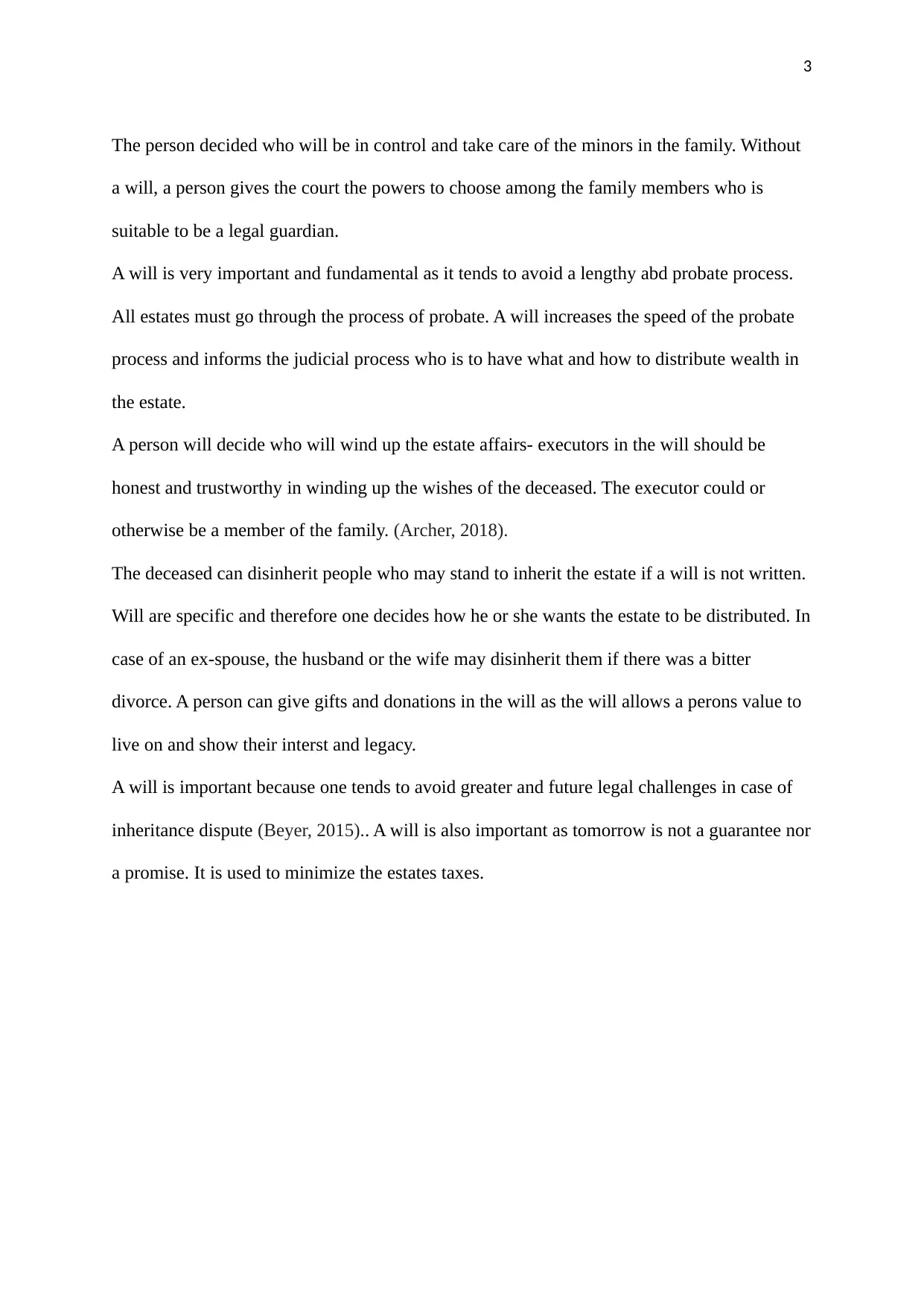
3
The person decided who will be in control and take care of the minors in the family. Without
a will, a person gives the court the powers to choose among the family members who is
suitable to be a legal guardian.
A will is very important and fundamental as it tends to avoid a lengthy abd probate process.
All estates must go through the process of probate. A will increases the speed of the probate
process and informs the judicial process who is to have what and how to distribute wealth in
the estate.
A person will decide who will wind up the estate affairs- executors in the will should be
honest and trustworthy in winding up the wishes of the deceased. The executor could or
otherwise be a member of the family. (Archer, 2018).
The deceased can disinherit people who may stand to inherit the estate if a will is not written.
Will are specific and therefore one decides how he or she wants the estate to be distributed. In
case of an ex-spouse, the husband or the wife may disinherit them if there was a bitter
divorce. A person can give gifts and donations in the will as the will allows a perons value to
live on and show their interst and legacy.
A will is important because one tends to avoid greater and future legal challenges in case of
inheritance dispute (Beyer, 2015).. A will is also important as tomorrow is not a guarantee nor
a promise. It is used to minimize the estates taxes.
The person decided who will be in control and take care of the minors in the family. Without
a will, a person gives the court the powers to choose among the family members who is
suitable to be a legal guardian.
A will is very important and fundamental as it tends to avoid a lengthy abd probate process.
All estates must go through the process of probate. A will increases the speed of the probate
process and informs the judicial process who is to have what and how to distribute wealth in
the estate.
A person will decide who will wind up the estate affairs- executors in the will should be
honest and trustworthy in winding up the wishes of the deceased. The executor could or
otherwise be a member of the family. (Archer, 2018).
The deceased can disinherit people who may stand to inherit the estate if a will is not written.
Will are specific and therefore one decides how he or she wants the estate to be distributed. In
case of an ex-spouse, the husband or the wife may disinherit them if there was a bitter
divorce. A person can give gifts and donations in the will as the will allows a perons value to
live on and show their interst and legacy.
A will is important because one tends to avoid greater and future legal challenges in case of
inheritance dispute (Beyer, 2015).. A will is also important as tomorrow is not a guarantee nor
a promise. It is used to minimize the estates taxes.
⊘ This is a preview!⊘
Do you want full access?
Subscribe today to unlock all pages.

Trusted by 1+ million students worldwide
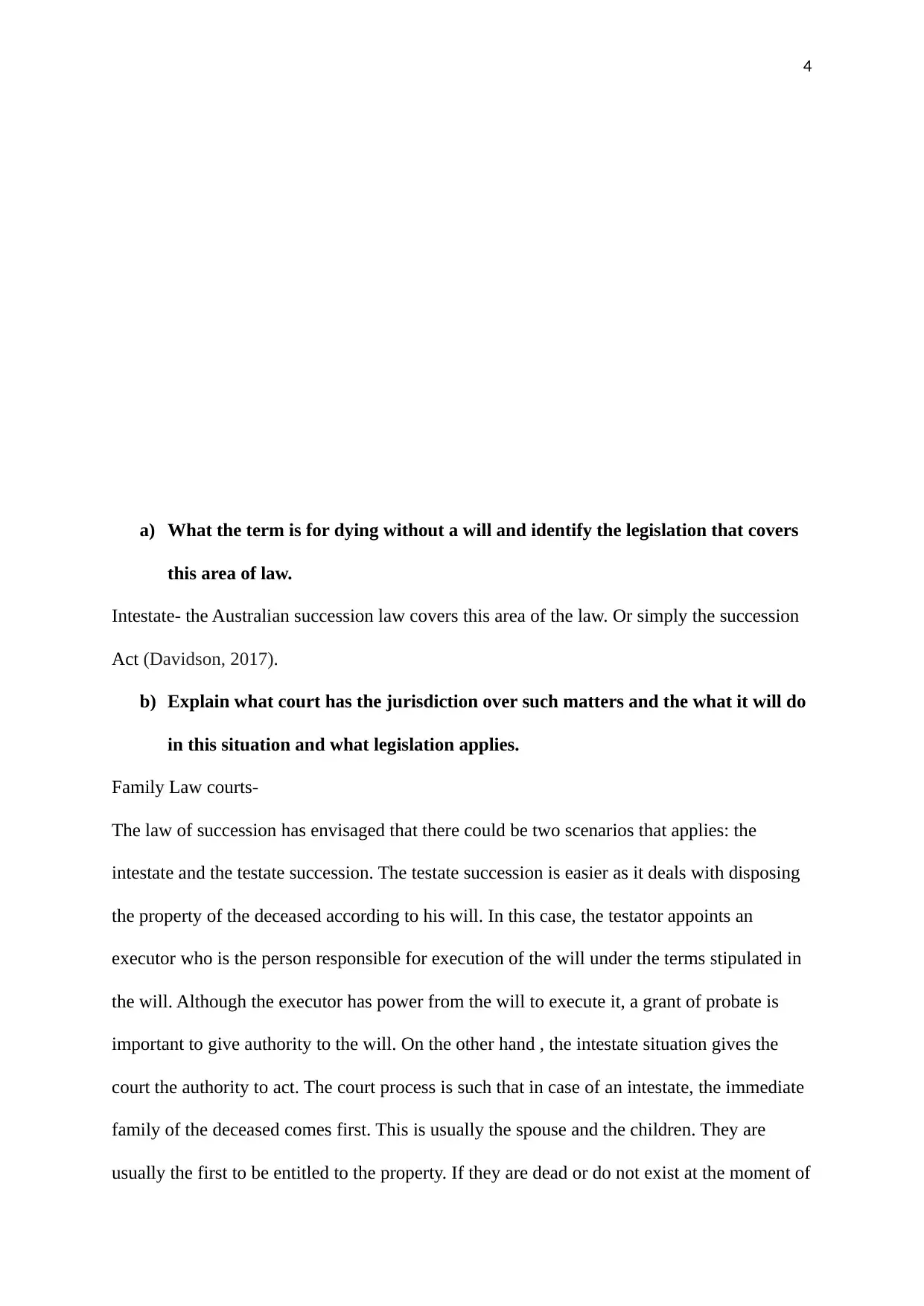
4
a) What the term is for dying without a will and identify the legislation that covers
this area of law.
Intestate- the Australian succession law covers this area of the law. Or simply the succession
Act (Davidson, 2017).
b) Explain what court has the jurisdiction over such matters and the what it will do
in this situation and what legislation applies.
Family Law courts-
The law of succession has envisaged that there could be two scenarios that applies: the
intestate and the testate succession. The testate succession is easier as it deals with disposing
the property of the deceased according to his will. In this case, the testator appoints an
executor who is the person responsible for execution of the will under the terms stipulated in
the will. Although the executor has power from the will to execute it, a grant of probate is
important to give authority to the will. On the other hand , the intestate situation gives the
court the authority to act. The court process is such that in case of an intestate, the immediate
family of the deceased comes first. This is usually the spouse and the children. They are
usually the first to be entitled to the property. If they are dead or do not exist at the moment of
a) What the term is for dying without a will and identify the legislation that covers
this area of law.
Intestate- the Australian succession law covers this area of the law. Or simply the succession
Act (Davidson, 2017).
b) Explain what court has the jurisdiction over such matters and the what it will do
in this situation and what legislation applies.
Family Law courts-
The law of succession has envisaged that there could be two scenarios that applies: the
intestate and the testate succession. The testate succession is easier as it deals with disposing
the property of the deceased according to his will. In this case, the testator appoints an
executor who is the person responsible for execution of the will under the terms stipulated in
the will. Although the executor has power from the will to execute it, a grant of probate is
important to give authority to the will. On the other hand , the intestate situation gives the
court the authority to act. The court process is such that in case of an intestate, the immediate
family of the deceased comes first. This is usually the spouse and the children. They are
usually the first to be entitled to the property. If they are dead or do not exist at the moment of
Paraphrase This Document
Need a fresh take? Get an instant paraphrase of this document with our AI Paraphraser
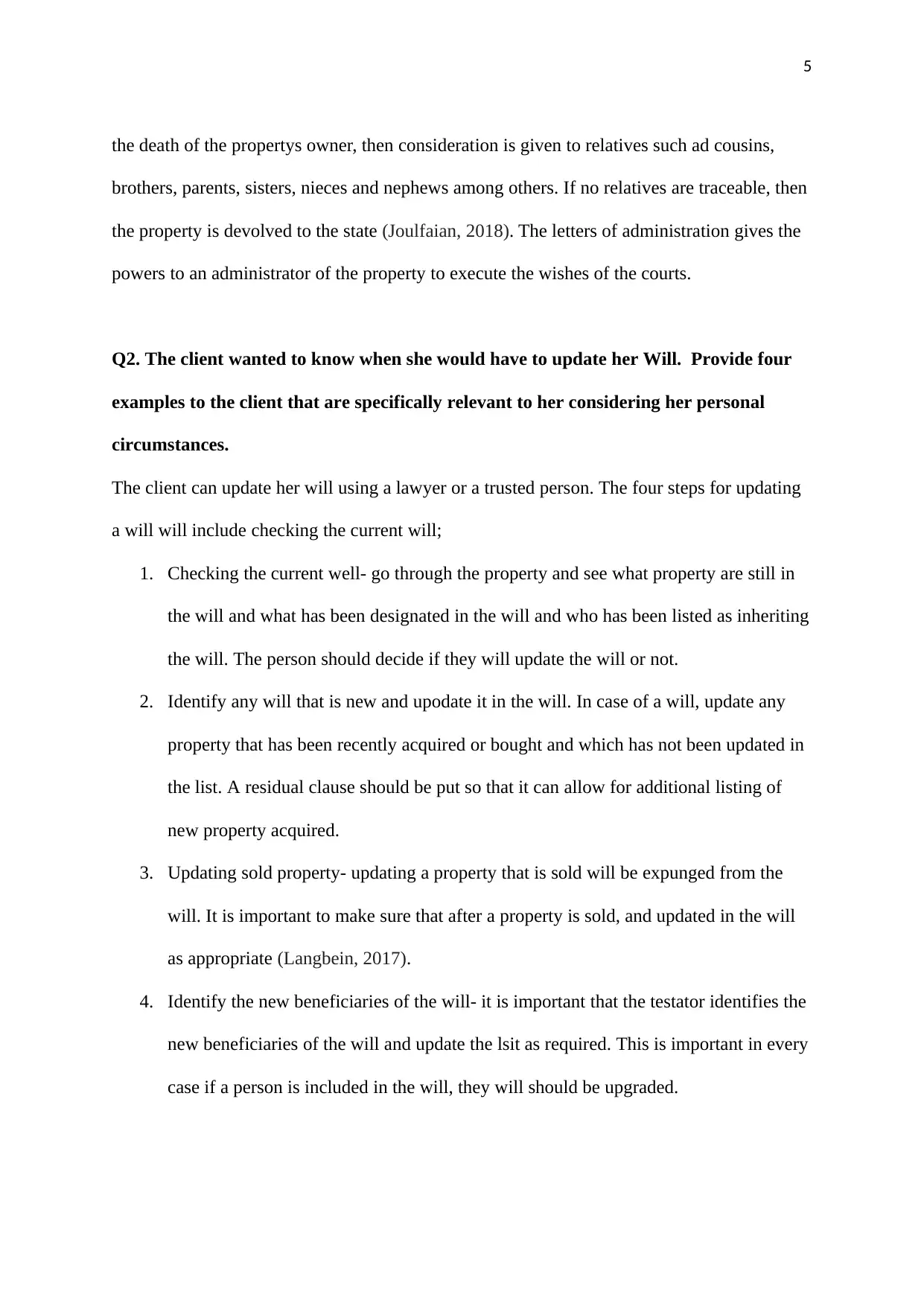
5
the death of the propertys owner, then consideration is given to relatives such ad cousins,
brothers, parents, sisters, nieces and nephews among others. If no relatives are traceable, then
the property is devolved to the state (Joulfaian, 2018). The letters of administration gives the
powers to an administrator of the property to execute the wishes of the courts.
Q2. The client wanted to know when she would have to update her Will. Provide four
examples to the client that are specifically relevant to her considering her personal
circumstances.
The client can update her will using a lawyer or a trusted person. The four steps for updating
a will will include checking the current will;
1. Checking the current well- go through the property and see what property are still in
the will and what has been designated in the will and who has been listed as inheriting
the will. The person should decide if they will update the will or not.
2. Identify any will that is new and upodate it in the will. In case of a will, update any
property that has been recently acquired or bought and which has not been updated in
the list. A residual clause should be put so that it can allow for additional listing of
new property acquired.
3. Updating sold property- updating a property that is sold will be expunged from the
will. It is important to make sure that after a property is sold, and updated in the will
as appropriate (Langbein, 2017).
4. Identify the new beneficiaries of the will- it is important that the testator identifies the
new beneficiaries of the will and update the lsit as required. This is important in every
case if a person is included in the will, they will should be upgraded.
the death of the propertys owner, then consideration is given to relatives such ad cousins,
brothers, parents, sisters, nieces and nephews among others. If no relatives are traceable, then
the property is devolved to the state (Joulfaian, 2018). The letters of administration gives the
powers to an administrator of the property to execute the wishes of the courts.
Q2. The client wanted to know when she would have to update her Will. Provide four
examples to the client that are specifically relevant to her considering her personal
circumstances.
The client can update her will using a lawyer or a trusted person. The four steps for updating
a will will include checking the current will;
1. Checking the current well- go through the property and see what property are still in
the will and what has been designated in the will and who has been listed as inheriting
the will. The person should decide if they will update the will or not.
2. Identify any will that is new and upodate it in the will. In case of a will, update any
property that has been recently acquired or bought and which has not been updated in
the list. A residual clause should be put so that it can allow for additional listing of
new property acquired.
3. Updating sold property- updating a property that is sold will be expunged from the
will. It is important to make sure that after a property is sold, and updated in the will
as appropriate (Langbein, 2017).
4. Identify the new beneficiaries of the will- it is important that the testator identifies the
new beneficiaries of the will and update the lsit as required. This is important in every
case if a person is included in the will, they will should be upgraded.
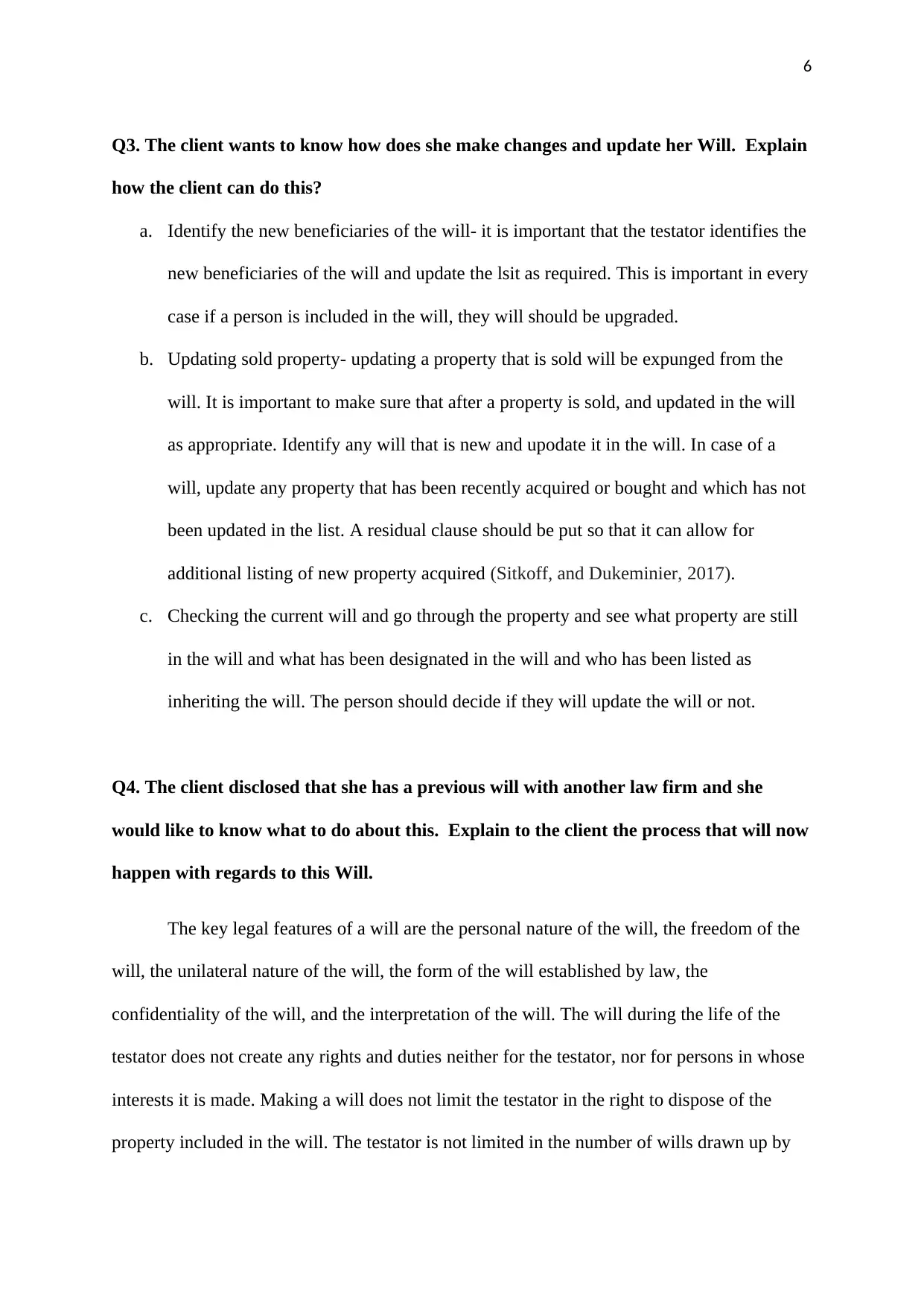
6
Q3. The client wants to know how does she make changes and update her Will. Explain
how the client can do this?
a. Identify the new beneficiaries of the will- it is important that the testator identifies the
new beneficiaries of the will and update the lsit as required. This is important in every
case if a person is included in the will, they will should be upgraded.
b. Updating sold property- updating a property that is sold will be expunged from the
will. It is important to make sure that after a property is sold, and updated in the will
as appropriate. Identify any will that is new and upodate it in the will. In case of a
will, update any property that has been recently acquired or bought and which has not
been updated in the list. A residual clause should be put so that it can allow for
additional listing of new property acquired (Sitkoff, and Dukeminier, 2017).
c. Checking the current will and go through the property and see what property are still
in the will and what has been designated in the will and who has been listed as
inheriting the will. The person should decide if they will update the will or not.
Q4. The client disclosed that she has a previous will with another law firm and she
would like to know what to do about this. Explain to the client the process that will now
happen with regards to this Will.
The key legal features of a will are the personal nature of the will, the freedom of the
will, the unilateral nature of the will, the form of the will established by law, the
confidentiality of the will, and the interpretation of the will. The will during the life of the
testator does not create any rights and duties neither for the testator, nor for persons in whose
interests it is made. Making a will does not limit the testator in the right to dispose of the
property included in the will. The testator is not limited in the number of wills drawn up by
Q3. The client wants to know how does she make changes and update her Will. Explain
how the client can do this?
a. Identify the new beneficiaries of the will- it is important that the testator identifies the
new beneficiaries of the will and update the lsit as required. This is important in every
case if a person is included in the will, they will should be upgraded.
b. Updating sold property- updating a property that is sold will be expunged from the
will. It is important to make sure that after a property is sold, and updated in the will
as appropriate. Identify any will that is new and upodate it in the will. In case of a
will, update any property that has been recently acquired or bought and which has not
been updated in the list. A residual clause should be put so that it can allow for
additional listing of new property acquired (Sitkoff, and Dukeminier, 2017).
c. Checking the current will and go through the property and see what property are still
in the will and what has been designated in the will and who has been listed as
inheriting the will. The person should decide if they will update the will or not.
Q4. The client disclosed that she has a previous will with another law firm and she
would like to know what to do about this. Explain to the client the process that will now
happen with regards to this Will.
The key legal features of a will are the personal nature of the will, the freedom of the
will, the unilateral nature of the will, the form of the will established by law, the
confidentiality of the will, and the interpretation of the will. The will during the life of the
testator does not create any rights and duties neither for the testator, nor for persons in whose
interests it is made. Making a will does not limit the testator in the right to dispose of the
property included in the will. The testator is not limited in the number of wills drawn up by
⊘ This is a preview!⊘
Do you want full access?
Subscribe today to unlock all pages.

Trusted by 1+ million students worldwide
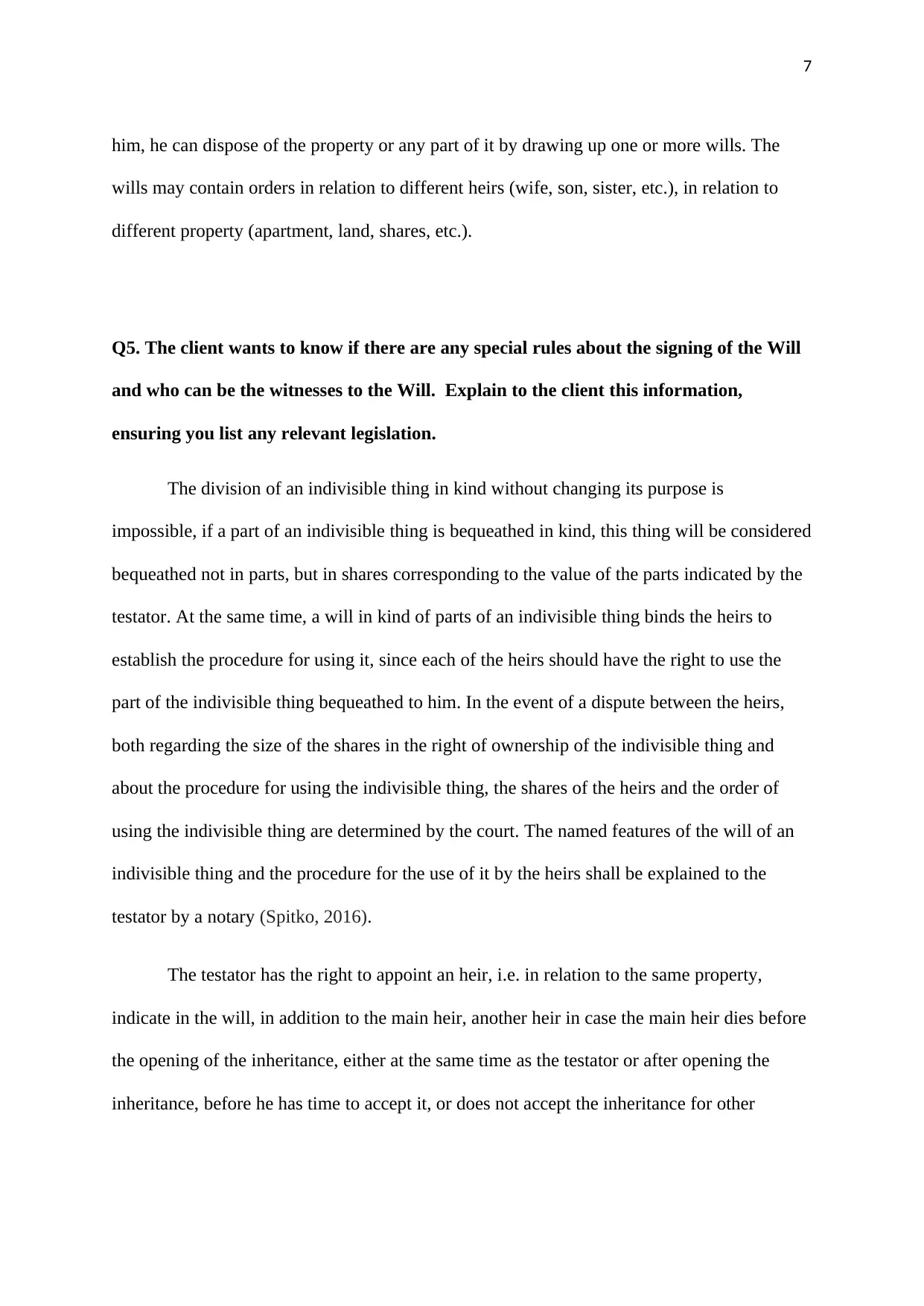
7
him, he can dispose of the property or any part of it by drawing up one or more wills. The
wills may contain orders in relation to different heirs (wife, son, sister, etc.), in relation to
different property (apartment, land, shares, etc.).
Q5. The client wants to know if there are any special rules about the signing of the Will
and who can be the witnesses to the Will. Explain to the client this information,
ensuring you list any relevant legislation.
The division of an indivisible thing in kind without changing its purpose is
impossible, if a part of an indivisible thing is bequeathed in kind, this thing will be considered
bequeathed not in parts, but in shares corresponding to the value of the parts indicated by the
testator. At the same time, a will in kind of parts of an indivisible thing binds the heirs to
establish the procedure for using it, since each of the heirs should have the right to use the
part of the indivisible thing bequeathed to him. In the event of a dispute between the heirs,
both regarding the size of the shares in the right of ownership of the indivisible thing and
about the procedure for using the indivisible thing, the shares of the heirs and the order of
using the indivisible thing are determined by the court. The named features of the will of an
indivisible thing and the procedure for the use of it by the heirs shall be explained to the
testator by a notary (Spitko, 2016).
The testator has the right to appoint an heir, i.e. in relation to the same property,
indicate in the will, in addition to the main heir, another heir in case the main heir dies before
the opening of the inheritance, either at the same time as the testator or after opening the
inheritance, before he has time to accept it, or does not accept the inheritance for other
him, he can dispose of the property or any part of it by drawing up one or more wills. The
wills may contain orders in relation to different heirs (wife, son, sister, etc.), in relation to
different property (apartment, land, shares, etc.).
Q5. The client wants to know if there are any special rules about the signing of the Will
and who can be the witnesses to the Will. Explain to the client this information,
ensuring you list any relevant legislation.
The division of an indivisible thing in kind without changing its purpose is
impossible, if a part of an indivisible thing is bequeathed in kind, this thing will be considered
bequeathed not in parts, but in shares corresponding to the value of the parts indicated by the
testator. At the same time, a will in kind of parts of an indivisible thing binds the heirs to
establish the procedure for using it, since each of the heirs should have the right to use the
part of the indivisible thing bequeathed to him. In the event of a dispute between the heirs,
both regarding the size of the shares in the right of ownership of the indivisible thing and
about the procedure for using the indivisible thing, the shares of the heirs and the order of
using the indivisible thing are determined by the court. The named features of the will of an
indivisible thing and the procedure for the use of it by the heirs shall be explained to the
testator by a notary (Spitko, 2016).
The testator has the right to appoint an heir, i.e. in relation to the same property,
indicate in the will, in addition to the main heir, another heir in case the main heir dies before
the opening of the inheritance, either at the same time as the testator or after opening the
inheritance, before he has time to accept it, or does not accept the inheritance for other
Paraphrase This Document
Need a fresh take? Get an instant paraphrase of this document with our AI Paraphraser
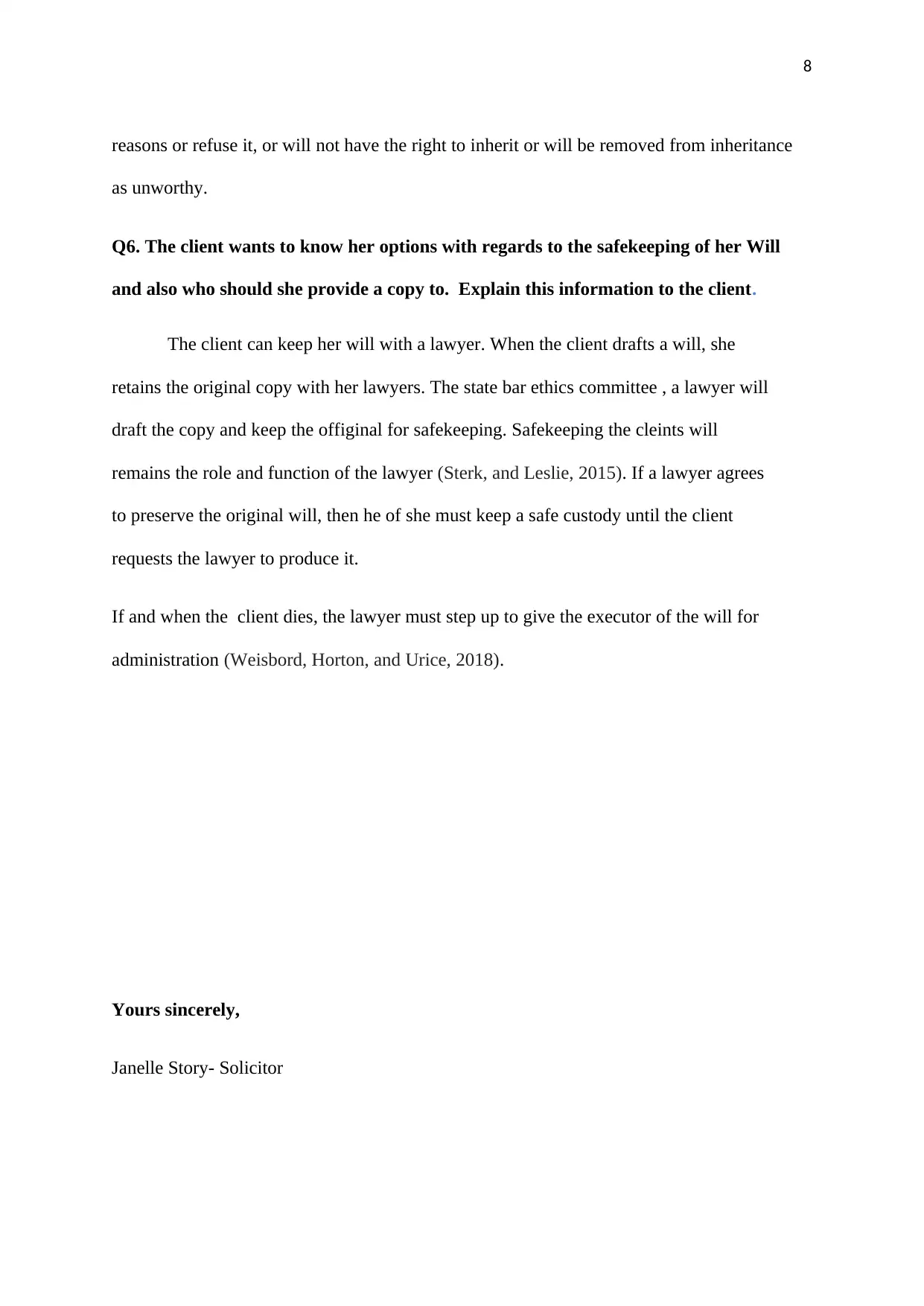
8
reasons or refuse it, or will not have the right to inherit or will be removed from inheritance
as unworthy.
Q6. The client wants to know her options with regards to the safekeeping of her Will
and also who should she provide a copy to. Explain this information to the client.
The client can keep her will with a lawyer. When the client drafts a will, she
retains the original copy with her lawyers. The state bar ethics committee , a lawyer will
draft the copy and keep the offiginal for safekeeping. Safekeeping the cleints will
remains the role and function of the lawyer (Sterk, and Leslie, 2015). If a lawyer agrees
to preserve the original will, then he of she must keep a safe custody until the client
requests the lawyer to produce it.
If and when the client dies, the lawyer must step up to give the executor of the will for
administration (Weisbord, Horton, and Urice, 2018).
Yours sincerely,
Janelle Story- Solicitor
reasons or refuse it, or will not have the right to inherit or will be removed from inheritance
as unworthy.
Q6. The client wants to know her options with regards to the safekeeping of her Will
and also who should she provide a copy to. Explain this information to the client.
The client can keep her will with a lawyer. When the client drafts a will, she
retains the original copy with her lawyers. The state bar ethics committee , a lawyer will
draft the copy and keep the offiginal for safekeeping. Safekeeping the cleints will
remains the role and function of the lawyer (Sterk, and Leslie, 2015). If a lawyer agrees
to preserve the original will, then he of she must keep a safe custody until the client
requests the lawyer to produce it.
If and when the client dies, the lawyer must step up to give the executor of the will for
administration (Weisbord, Horton, and Urice, 2018).
Yours sincerely,
Janelle Story- Solicitor
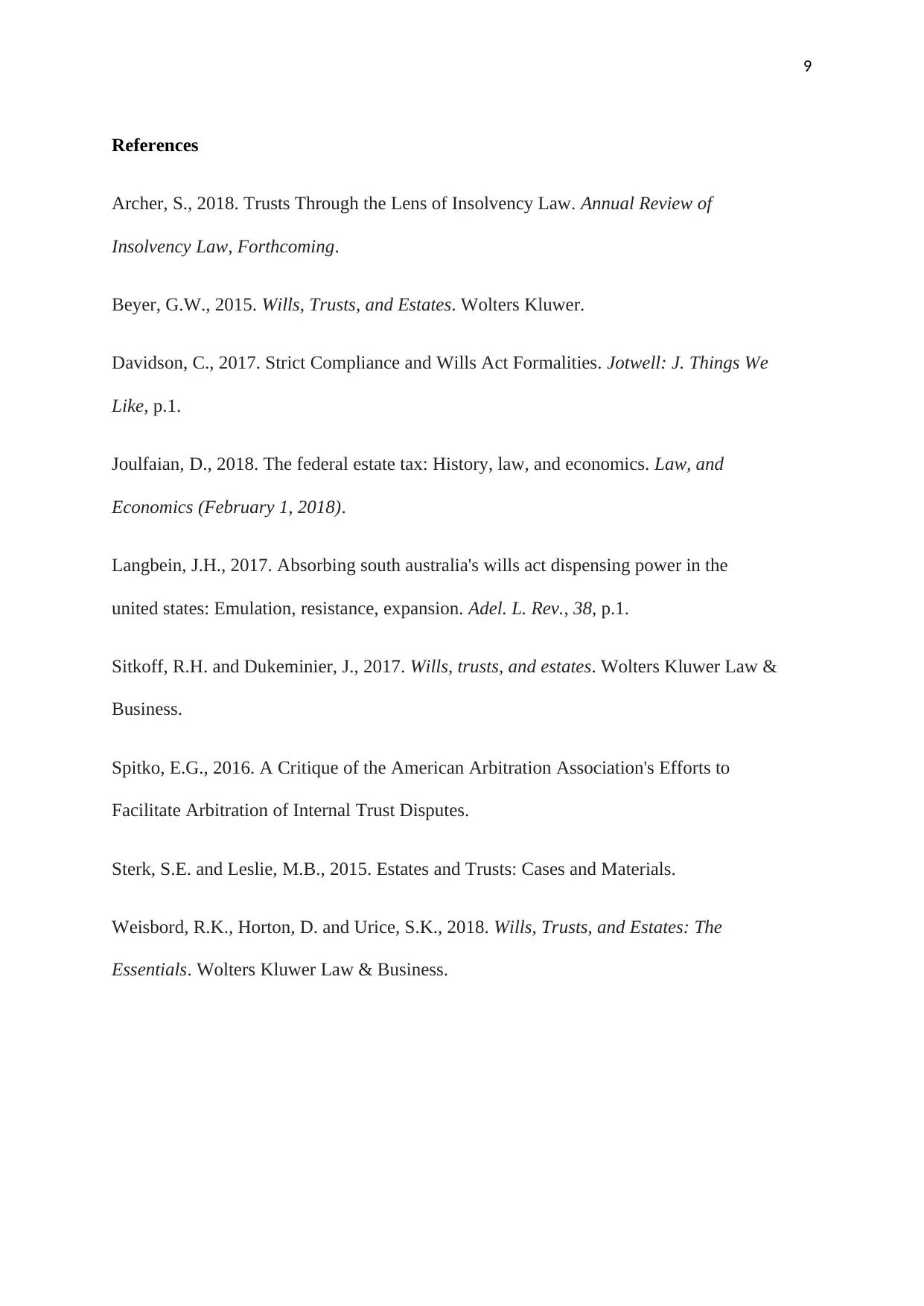
9
References
Archer, S., 2018. Trusts Through the Lens of Insolvency Law. Annual Review of
Insolvency Law, Forthcoming.
Beyer, G.W., 2015. Wills, Trusts, and Estates. Wolters Kluwer.
Davidson, C., 2017. Strict Compliance and Wills Act Formalities. Jotwell: J. Things We
Like, p.1.
Joulfaian, D., 2018. The federal estate tax: History, law, and economics. Law, and
Economics (February 1, 2018).
Langbein, J.H., 2017. Absorbing south australia's wills act dispensing power in the
united states: Emulation, resistance, expansion. Adel. L. Rev., 38, p.1.
Sitkoff, R.H. and Dukeminier, J., 2017. Wills, trusts, and estates. Wolters Kluwer Law &
Business.
Spitko, E.G., 2016. A Critique of the American Arbitration Association's Efforts to
Facilitate Arbitration of Internal Trust Disputes.
Sterk, S.E. and Leslie, M.B., 2015. Estates and Trusts: Cases and Materials.
Weisbord, R.K., Horton, D. and Urice, S.K., 2018. Wills, Trusts, and Estates: The
Essentials. Wolters Kluwer Law & Business.
References
Archer, S., 2018. Trusts Through the Lens of Insolvency Law. Annual Review of
Insolvency Law, Forthcoming.
Beyer, G.W., 2015. Wills, Trusts, and Estates. Wolters Kluwer.
Davidson, C., 2017. Strict Compliance and Wills Act Formalities. Jotwell: J. Things We
Like, p.1.
Joulfaian, D., 2018. The federal estate tax: History, law, and economics. Law, and
Economics (February 1, 2018).
Langbein, J.H., 2017. Absorbing south australia's wills act dispensing power in the
united states: Emulation, resistance, expansion. Adel. L. Rev., 38, p.1.
Sitkoff, R.H. and Dukeminier, J., 2017. Wills, trusts, and estates. Wolters Kluwer Law &
Business.
Spitko, E.G., 2016. A Critique of the American Arbitration Association's Efforts to
Facilitate Arbitration of Internal Trust Disputes.
Sterk, S.E. and Leslie, M.B., 2015. Estates and Trusts: Cases and Materials.
Weisbord, R.K., Horton, D. and Urice, S.K., 2018. Wills, Trusts, and Estates: The
Essentials. Wolters Kluwer Law & Business.
⊘ This is a preview!⊘
Do you want full access?
Subscribe today to unlock all pages.

Trusted by 1+ million students worldwide
1 out of 9
Your All-in-One AI-Powered Toolkit for Academic Success.
+13062052269
info@desklib.com
Available 24*7 on WhatsApp / Email
![[object Object]](/_next/static/media/star-bottom.7253800d.svg)
Unlock your academic potential
Copyright © 2020–2025 A2Z Services. All Rights Reserved. Developed and managed by ZUCOL.